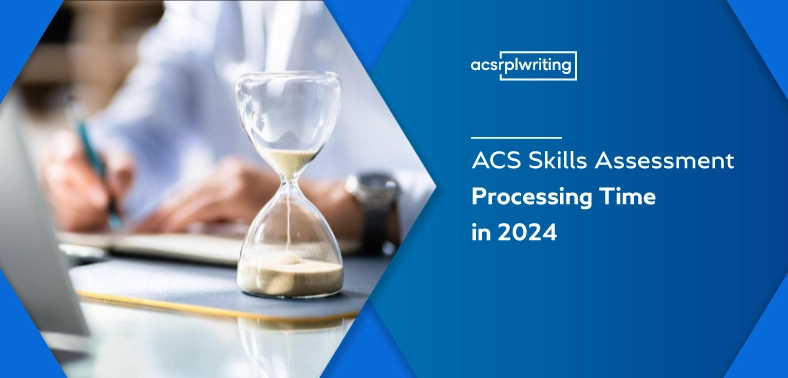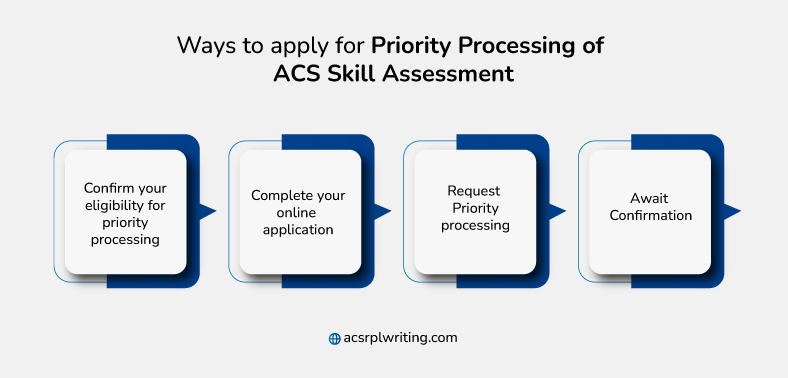
ACS Skills Assessment Processing Time in 2024
ACS Skills Assessment Processing Time in 2024
Are you eagerly anticipating your ACS skills assessment to bring you closer to fulfilling your dream of immigrating to Australia? How long will it take? Here’s what you need to know about the ACS Skills Assessment processing time.
To begin your journey, you must undergo a skills assessment by the Australian Computer Society (ACS), the recognized authority for evaluating ICT skills for migration purposes. The ACS conducts a comprehensive assessment of your qualifications and work experience.
Moreover, ensuring that your documentation aligns with the ACS requirements is vital. For instance, your work experience letters should be written on company letterhead and include specific information like job title, responsibilities, and duration of employment.
If you are an IT professional planning to migrate to Australia, the ACS skills assessment is a vital step in your journey. To navigate the process effectively, it’s essential to have a thorough understanding of the ACS skills assessment processing time in 2024.
This comprehensive guide will delve into various aspects of the ACS skills assessment process, providing detailed insights, tips, and valuable information for a successful assessment.
ACS Skills Assessment Processing Time
One common query among applicants is the processing time for an ACS skills assessment. The duration varies depending on certain factors. Applicants who do not require additional information can expect the skills assessment to be completed within 8–10 weeks.
Several factors impact the processing time, including the volume of applications received, the complexity of each case, and the completeness of the application.
The ACS aims to process applications within ten working days, provided all required documentation is submitted without issues. However, certain cases may take longer if additional documentation or clarification is needed.
Ensuring your application is accurate and complete is crucial to expediting the process. This involves submitting all necessary documents, such as academic transcripts, reference letters, and work experience letters while ensuring that the information provided is clear.
It’s important to note that if your application meets the ACS requirements and is deemed complete, it may face further delays in processing. Therefore, thoroughly reviewing the ACS guidelines and conditions before submission is essential.
While the processing time for an ACS skills assessment can vary based on ANZSCO codes and skill levels, patience is key. By preparing meticulously and paying attention to detail, you can contribute to a smooth and timely assessment process, bringing you one step closer to your goal of migrating to Australia for work.
Read More: Find out the most in-demand jobs in Australia. 🔔🔔
Factors Influencing ACS Skills Assessment Processing Time
Various factors influence the processing time for the ACS skills assessment in 2024. Understanding these factors will help you manage your expectations and plan your migration journey effectively. Here are the key factors:
Assessment Type
The ACS offers different assessment types, including Temporary Graduate, Skills, Recognition of Prior Learning (RPL), and more. Each type may have different processing times due to the nature and complexity of the assessment.
Application Completeness
Submitting a complete and accurate application is crucial to avoid delays. Ensure you provide all the necessary documents and information for your chosen assessment type.
Case Complexity
The complexity of your case can impact the processing time. The assessment may take longer if your qualifications or work experience require an in-depth evaluation.
ACS Skills Assessment Processing Time by Assessment Type
Let’s explore the processing times associated with various ACS assessment types in more detail:
Learn More: What should we consider while writing Employment Reference Letter? 🤔🤔
1. Temporary Graduate, Skills, and Recognition of Prior Learning (RPL) Assessments
- Processing Time: Approximately 12 weeks.
- Description: These assessments evaluate your skills, qualifications, and work experience. The ACS carefully reviews the submitted documents to assess your suitability for migration to Australia.
2. Recognition of Prior Learning (RPL) Renewal Assessments
- Processing Time: Approximately 8 weeks
- Description: RPL renewal assessments are designed for individuals who previously received a positive RPL outcome and need to renew it. The assessment confirms that your skills and knowledge are up-to-date.
3. Post Australian Study Skills Assessments
- Processing Time: Usually around 8 weeks.
- Description: This assessment is for IT graduates who completed their studies in Australia and wish to apply for skilled migration. The ACS evaluates your qualifications and ensures they align with Australian standards.
4. Migration Skills Assessments
- Processing Time: Based on case complexity, typically 10 to 12 weeks.
- Description: These assessments are relevant for IT professionals applying for skilled migration through various visa subclasses. The ACS thoroughly evaluates your qualifications, employment history, and English language proficiency.
Editor’s Choice: Do you know the reasons for RPL rejection from ACS? 💪💪
How to apply for Priority Processing of ACS Skill Assessment?

If you require urgent processing of your ACS skills assessment, you can apply for priority processing. This enables faster application assessment than the standard processing time, which can be advantageous if you have a job offer or need to meet a deadline. From an SEO perspective, here’s a guide on how to apply for priority processing:
1. Confirm your eligibility for priority processing.
Determine if you qualify for priority processing by reviewing the eligibility criteria. Typically, priority processing is available for specific visa types, such as the Skilled Independent visa (subclass 189) or the Skilled Nominated visa (subclass 190), and for occupations in high demand in Australia. Visit the ACS website or the Department of Home Affairs for confirmation.
2. Complete your online application.
Submit your ACS skills assessment application online through the official ACS website. Ensure that you provide all required documentation and pay the application fee during the application process.
3. Priority processing.
After submitting your application, email the ACS using the provided email address on their website to request priority processing. In your email, clearly state why you need expedited processing and include supporting evidence, such as a job offer or proof of a deadline.
4. Await confirmation.
The ACS will evaluate your request for priority processing and inform you whether it has been approved. If approved, your application will be prioritized and processed promptly.
It’s important to note that priority processing may not always be available or guaranteed, and additional fees may be associated with this service. Therefore, it is crucial to assess your situation carefully and needs before requesting priority processing for your ACS skilled migration assessment.
Useful tips for a smooth ACS Skills Assessment process
To enhance your ACS skills assessment experience and minimize processing time, consider the following tips:
Read More: Benefits of RPL report for ICT Applicants. 🌟🌟
a. Thoroughly review requirements
Familiarize yourself with the assessment guidelines and requirements provided by the ACS. Ensure that you gather all the necessary documents and submit them accurately.
b. Submit a well-organized application
Maintain a structured application, clearly presenting your qualifications, work experience, and supporting evidence. A well-organized application can expedite the assessment process.
c. Double-check information
Before submitting your application, double-check all the information for accuracy. Any discrepancies or missing details may lead to delays.
d. Follow ACS communication
Stay vigilant and promptly respond to any communication from the ACS during the assessment process. Addressing their queries and requests on time can help streamline the process.
Conclusion
To conclude, the processing time for an ACS skills assessment might vary based on several factors, including the application’s completeness and accuracy, the volume of applications being handled at a given time, and any extra checks or verifications required.
While the precise processing time cannot be guaranteed, applicants can help speed up the process by submitting all required documents and information in advance and responding quickly to requests for further information or clarification.
Applicants can help ensure a smoother and faster assessment by being proactive and attentive throughout the application process, bringing them one step closer to achieving their dreams of permanent residency in Australia.
If you need any RPL reports, documentation, or skill assessment assistance, please contact ACSRPLWriting for a free consultation.





